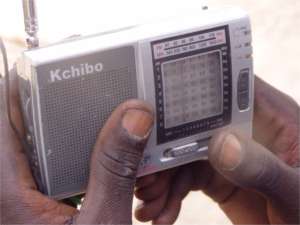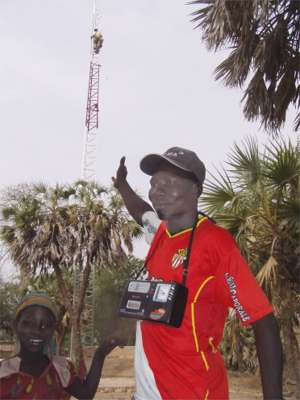|
FM 95.2 "The Voice of Chageen" was conceived back in
2002 as a means of doing an end-run around the illiteracy which had been rending
our efforts at translation ineffective. The station was built in early 2005 with
hope that men and women in Kwongland and in neighboring tribes who could not read
the Scriptures could listen to them. The following are common
questions we frequently answer regarding the operation of the station.
How can you keep the radio going all day long?
We can't. Our vision for this radio station is not to entertain people on
their commute to work. It is to disciple Kwong Christians, and enhance
non-Christians' perception of Christianity. Having said that, our intention is
to fire up the radio station for 15 minutes early each morning when Christian
families traditionally have their morning devotions, and read the Scriptures we
have translated. We will then shut the station down until evening, when we will
again broadcast for an hour or two.
What will you broadcast?
Besides straight, simple reading of the Scriptures, we
envisage broadcasting the discipleship lessons we have have written over the
years, and the Kwong Kingdom of God theology materials we have produced. Diane
will with Kwong musicians record indigenous music for broadcast, and then adapt
Scripture passages to those tunes for performance, recording, and subsequent
broadcast. In order to appeal to the non-Christian audience and play a proactive
role in the development of the community, we will offer public service
announcements (e.g. the chief says everybody tie up their goats, the vet is
vaccinating cows tomorrow, etc) and private announcements (obituaries being a
very popular item in Kwongland).
 Do people have radios? Do people have radios?
We figure that about every second family owns a radio. They can be purchased
in the local market from traveling merchants at harvest time - which is, not
coincidentally, also the time of year when the people can afford them. (Cheap
ones go for about $6.) We have decided that at these relatively cheap prices there
is no reason for us to get involved with the purchase and distribution of radios for people.
What about other languages?
In the application to the government for our license, we portrayed FM 95.2 as a
"vernacular" radio station, and listed 5 languages which we hope we
can reach with it. We also specified that 70% of our programming would be in
these languages, and not more than 30% would be in French and Arabic (the
national languages of Chad.) In fact, it will take time to develop programming
in neighboring languages, but we will begin immediately with one of them:
Fulani, the language of the Muslim nomads who pass regularly through our area. A
radio station in Cameroon already produces programming for the Fulani, and they
are happy to provide us with cassettes of their programs for rebroadcast on FM
95.2.
How far does the radio reach?
We know it reaches more than 40 miles to the north, and
probably around 30 miles to the south. FM 95.2 is the only FM station audible in
our part of Chad. It is only the second Christian radio station in all of
Chad.
How will it be funded now that it is built?
The statutes of the radio station which we filed with the
government stipulate that the station function on a volunteer basis. That means
the only real long-term expenses would be replacing the solar batteries every 7
years or so that make the station run, and paying the annual licensing fee to
the government. We hope to be able to cover these expenses, as well as give a
small "stipend of appreciation" to those individuals who volunteer the
most by selling private announcements on the radio. People desperately want the
rest of the world (or at least the rest of Kwongland) to know when their
loved-ones die and when their babies are born, so we anticipate that this will
be quite an effective means of on-going funding for the station (as in fact
similar stations in Mali have already proven it to be.)
 What
do the Kwong think about the station? What
do the Kwong think about the station?
They could not be more thrilled at having a radio station in
their village. It "puts them on the map" and elevates their language
in the eyes of surrounding languages. We tested the station 5 times for 15
minutes each time in March 2005, and each time people begged us to broadcast more.
What about AIDS?
AIDS is not a big problem in Kwongland - yet. The virus is
floating around, and when it finally becomes prevalent in Kwong society, it will
spread like wildfire, given the promiscuity of the Kwong. Already, Kwong men and
women who contract the disease in the big cities are coming back to the village
with increasing frequency - to die. But talking about AIDS is taboo. It is never
offered as a cause of death, and never suggested as a good reason to abstain
from extra-marital sex. We hope with FM 95.2 to address this issue with a
persistence and frankness which will, with time, break down the taboo and save
lives. Radio offers a kind of impersonal detachment, as well as the potential
for relentlessness which it will undoubtedly take to break through the lies,
ignorance, and fear surrounding the subject of AIDS today.
|

 Do people have radios?
Do people have radios? What
do the Kwong think about the station?
What
do the Kwong think about the station?